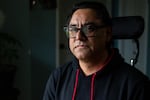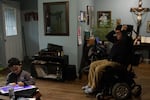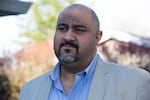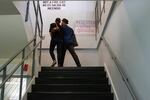As the 2020 primaries approach, many newly naturalized citizens in Oregon will be casting their votes in an American election for the first time.
The issues driving their votes are as varied as the experiences of the voters themselves. For some, voting is a way to push forward change in key political issues: education, climate change or immigration policy. Others will be casting their ballots to try to elect leaders that look more like them.
OPB spoke to three immigrant Oregonians about their thoughts and the issues that they are paying attention to ahead of the primary. Each of them sees voting as a responsibility to their communities and a way to stay engaged.
They're part of a growing group in the United States. This year, naturalized citizens make up a record 1 in 10 of the nation's eligible voters.
In the 2018 midterms, they made up more than 8% of the vote in the U.S. That’s almost twice the share from the 1996 presidential election, according to the U.S. Census Bureau.
Oregon’s immigrant population has hovered around 10% for the past decade. Naturalized citizens make up just over 4% of the state’s population.
Here are stories from three immigrant Oregonians looking forward to voting in 2020.
'Being part of a healthy democracy is ... voting.'
Jorge Cisneros’ living room walls are decorated with his parents’ wedding photos, family portraits and a picture of Pope John Paul II. Directly underneath, Cisneros has pinned up the words to the Declaration of Independence.
When Cisneros reads it, he chokes up.
“I feel like crying when I read this,” he said. “Because the beauty of it.”

Jorge Cisneros at his home in Hillsboro, Ore., Feb. 29, 2020. Cisneros is excited to vote, but has struggled to find candidate information.
Kaylee Domzalski / OPB
Cisneros, 49, has lived in Hillsboro since 1986, when he immigrated at the age of 16 from the Mexican state of Michoacan. He’s lived in Oregon as a permanent resident for more than 30 years.
In 2017, Cisneros decided to naturalize as a U.S. citizen. The biggest reason: He wants to vote for the first time in the 2020 election.
“I want to be part of a healthy democracy,” he said. “And the more I look into it, being part of a healthy democracy is to exercise the privilege of voting.”
In Washington County, where Cisneros lives, immigrants make up more than 17% of the population, according to the U.S. Census Bureau. That’s the highest percentage of any county in the state.
But Cisneros said he doesn’t see many leaders in office who share his experiences. In addition to being an immigrant, Cisneros is disabled and uses a wheelchair.

Lines from the United States Declaration of Independence are tacked onto the wall of Jorge Cisneros’ living room.
Kaylee Domzalski / OPB
In late February, Cisneros was feeling discouraged and nervous about voting. He had trouble finding information about local races. Not a single campaign had reached out to him.
“As a first-time voter, I’m looking for someone to share the same experiences I have,” he said. “And I don’t see nothing out there.”
That's a common concern for immigrant voters and voters of color, according to Luz Reyna, the executive director of progressive political action committee East County Rising.
She works with historically underrepresented voters in East Multnomah County to bring more diverse leaders into elected office.
“When there’s a lack of leadership that looks like the community, people are just disengaged,” Reyna said.
And like Cisneros, many have never been engaged by political campaigns. When Reyna was canvassing in 2018, many of the voters she spoke with said they’d never had a volunteer knock on their door.
Now, the coronavirus pandemic makes traditional voter outreach all but impossible. Social distancing means volunteers can't go door to door or hold in-person events. That means political groups such as East County Rising are relying more on phone banking, Zoom calls and social media to reach voters.
Social media is how Cisneros finally found a candidate he's excited to vote for. In late April, a friend sent him a Facebook page for Manuel Castaneda, a Hillsboro business owner running for the Washington County board. Cisneros likes that Castaneda is also Latino and an immigrant.
The coronavirus pandemic worries Cisneros, though. He doesn’t want his 7-year-old son, Julian, to grow up in fear.
And since Gov. Kate Brown ordered the state's public schools to close in mid-March, it's been difficult for the family to adapt to distance learning at home. Julian is getting headaches from doing all his classwork online, and it's hard for him to focus.

Jorge Cisneros gets ready to go to the library with his son, Julian, in Hillsboro, Ore., Feb. 29, 2020.
Kaylee Domzalski / OPB
Cisneros fears the pandemic will widen the achievement gap between Latino students and white students. State education officials have said that they are concerned that distance learning will widen inequities in Oregon education and cause students of color and low-income students to fall further behind their peers.
Cisneros is thinking about moving to Chile or Costa Rica. He thinks his son could get a better education in a place where he’s not a minority.
He’s isn’t ready to leave yet, though. He’s still hopeful that he can help create change.
“As long as I’m here,” he said, “I am going to do everything that I can … to build a healthy community.”
'I’m done feeling disempowered.'
On the night of the election in 2018, Alma Hartman felt hopeful.
She was in the crowd at Jo Ann Hardesty's election party at Holocene in Portland. That night, Hardesty won her bid for Portland's city council, becoming the first woman of color elected to the position.
“Everybody was just optimistic,” Hartman said. “It was great to just know that there is hope. Within all the insanity … good people can come into office to represent different people's voices.”
Hartman, a 30-year-old Northeast Portland resident, has lived in Oregon since 2016. She was born in India, and immigrated to the United States from Singapore when she was 11 years old. When her father, a design engineer, got a job in Vermont, Hartman, her mother and her older brother followed.
In 2013, Hartman applied for her citizenship at age 23. She was sworn in as a U.S. citizen a few months later.
It was a difficult decision. Becoming an American citizen meant Hartman had to renounce her Indian citizenship. But she said it was the right choice.
“I'm so grateful to be American because it gives me a sense of ownership and pride and identity and purpose,” she said. “I can say that I'm from this corner of the world, and this is my community now, and I am a part of it.”

Alma Hartman at her home in Portland, Ore., Feb. 29, 2020.
Kaylee Domzalski / OPB
After going through the system herself, Hartman wants to see a streamlined process for people to get green cards, and more access to social services for immigrants and refugees who are struggling.
But she’s frustrated by how both Democrats and Republicans in Washington, D.C., have handled immigration. And she’s concerned that politicians from both parties don’t understand the complexity of the immigrant experience.
“A lot of times immigrants and people of color can be painted with a broad brush, and it's really not the case,” she said. “There's a lot of diversity within diversity. I think a lot of politicians miss how diverse [people of color are] by just lumping us all in one group.”
The coronavirus pandemic has Hartman thinking more about structural inequities for low-income people and people of color as she prepares to cast her ballot in the May primary.
Related: Immigrant Farmworkers Face Unique Challenges As Coronavirus Continues To Spread
People of color are more likely to work in fields where there's less ability to physical distance or telework, Multnomah County Public Health officials told OPB. And according to data from the Oregon Health Authority, Oregonians who are Black, Latino or Native American are more likely to get sick and die from COVID-19 than their white neighbors.
Hartman and her partner still have jobs and are able to work from home. But Hartman worries for people who have lost their jobs or have to work in unsafe conditions.
“Now there’s so much insight into all the structural inadequacies and the lack of equity,” she said. “I sometimes just feel overwhelmed by my place in all of it.”
But Hartman has also been inspired by local and state leaders' response to the pandemic. Following pressure from Portland Mayor Ted Wheeler and Multnomah County health officials, Oregon Gov. Kate Brown issued a statewide social distancing mandates ahead of many other states, a move credited with slowing the growth of COVID-19 cases in Oregon.
That’s made Hartman want to get more involved with local politics. She’s thinking about canvassing for more local issues. And she’s considering a move to a career in local government.
“Now I am seeing that my participation needs to be beyond my vote,” she said. “I’m done feeling disempowered.”
'I feel this is my responsibility for the future.'
Ahmed Al-Zubaidi still remembers his first election in 2005.
Al-Zubaidi was 27 at the time, living in Baghdad, Iraq, and working as a journalist. For most of his life, Iraq had operated under military governments. Iraq had held elections in the past under then-President Saddam Hussein. In 2002, Hussein claimed that 100% of Iraqis voted to reelect him. The elections were largely dismissed by outside governments as not credible.
The election in 2005 was the first general election after the 2003 U.S. invasion of Iraq, and the first after Hussein's government was overthrown. It was also criticized. Sunni Muslims largely boycotted the vote. But Al-Zubaidi believed it was a watershed moment for Iraq.
“This is the moment,” Al-Zubaidi said he remembered thinking. “We dreamed about it, to have free speech, the freedom to elect people.”

Ahmed Al-Zubaidi, from Iraq, is hopeful he will become a citizen in time to vote in the November election. Al-Zubaidi worked in Baghdad as a journalist for more than a decade.
David Stuckey / OPB
Al-Zubaidi is now 43 and lives in Beaverton. But the memory of the election in Iraq — and the importance of the right to vote — have stuck with him as the 2020 elections near.
He and his wife are currently in the process of applying for U.S. citizenship. Al-Zubaidi is hopeful he will become a citizen in time to vote in the November election.
“I know how much one vote has huge value,” he said. “Even one vote can mean a lot.”
Al-Zubaidi worked in Baghdad as a journalist for more than a decade. He worked with Radio Free Europe, which reports in countries where a free press is banned or censored. Al-Zubadi embedded with the U.S. Army for several years and often received death threats because of his work. Fearful, he and his family moved 11 times in 13 years.
In September 2014, Al-Zubaidi and his family decided to leave Iraq and come to Beaverton.
“I feel I sacrificed a lot,” he said. “But it’s worth it. Because I feel I sacrificed everything for my kids’ future.”
Now, Al-Zubaidi works for the Beaverton School District as a community liaison for the Newcomer Program, which helps students who are recent arrivals to the United States. He is also the founder of the Arabic House Organization, which focuses on helping immigrants and refugees in Oregon.
Al-Zubaidi and his wife were set to have their naturalization interviews in a few months. Then, the coronavirus pandemic hit, causing the U.S. Citizenship and Immigration Services to cancel citizenship interviews and oath ceremonies. It's unclear when they will resume.

A couple walks upstairs from the citizenship ceremony to register to vote. Fifty-two people became United States citizens in an afternoon ceremony at the United States Citizenship and Immigration Services Field Office in Portland, Ore., on Wednesday, March 4, 2020.
Kaylee Domzalski / OPB
The delays have been devastating, Al-Zubaidi said. His wife’s father in Iraq is sick, and until they get their citizenship, they are not able to travel to see him.
And Al-Zubaidi is concerned that now he may not become a citizen in time for the general election in November. But he's still holding out hope that he will naturalize in time to vote.
“I feel this is my responsibility for the future,” he said. “It's not just my future; it's my family’s and my community’s future. It’s all of America’s future.”
